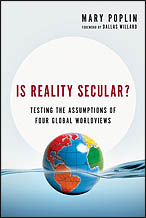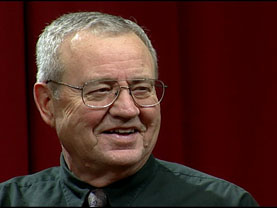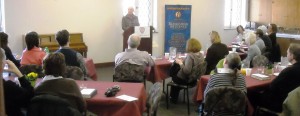
Note: In the first post of the Is Reality Secular? series, Mary Poplin shared what led her to write her new InterVarsity Press publication.
Tom: I have found Is Reality Secular? truly serving as a “resource for living in and actively influencing our culture without being overtaken by it.” Thank-you Mary. To assist the Emerging Scholar who has not yet had the opportunity to read and discuss your new publication, please give a brief snapshot of the four global worldviews with which you interact.
Mary: I have simply divided worldviews into the four primary ones – the two secular worldviews of material-naturalism and secular humanism and the worldviews of pantheism and monotheism (represented almost entirely in the book by the Judeo-Christian framework). Each of the three non-Christian worldviews counters a different member of the Godhead.
Material-naturalists insist that everything is ultimately reducible to material phenomena (e.g., electrons, bio-chemicals) even faith, love, and consciousness. All truth claims must be verified using the scientific method. Christians use these same methods for understanding the material world but do not believe material is all there is or all that can be known. The scientific method only begins once material has been identified, thus it is impossible for materialists to dismiss anything outside of the known material world. To materialists, the universe including human beings came into existence through purely material processes without plan or purpose. There can be no miracles in this worldview because they pose challenges to what is currently known about material and its laws. There is no meta-ethic in materialism except utilitarianism – the strong overcome the weak, what promotes survival of an organism is by definition good. Thus, many material-naturalists borrow from the ethics of secular humanism. Material naturalists primarily counter God as creator and sustainer of the world.

InterVarsity alumni – Dallas Willard (Gordon Govier. 5/14/2009).
As Dallas Willard points out, secular humanism is essentially a negative position; it proposes, at the outset, that God does not exist and that religions, gods, or spirits are simply inventions of human minds to explain what we don’t yet understand. Humans are essentially alone, living in anxiety; we escape this angst by making our selves and our world through our own thoughts, decisions and actions. Most every theory in the social sciences, humanities and arts emerges from some version of this position including, but not limited to, behaviorism, psychoanalysis, communism, structuralism, critical and cultural theories or postmodernism. Secular humanists hold particular disdain to the reality of sin. They place a high value on radical individual freedom and believe humans can be good without holding to a set of unchanging moral standards. Human communities progressively shape and reshape moral laws and culture through human dialogue and agreement. Of course this raises a question regarding whom will be chosen and by what process people will renegotiate moral norms and how will they be enforced. In general, secular humanists, like Christians, profess to value some version of Christ’s second commandment – do unto others – but not His first. It is eminently more possible to love others when we first love the Lord our God with all our hearts, soul, minds, and strength. Because human beings become the measure of all things, Jesus, the Christ, both divine and human is resisted; at best he can be just another great teacher, like Buddha, though no other great teacher claimed to be God’s Son, the Christ.
The third worldview of pantheism is the religion most compatible with secular humanism. The category “spiritual but not religious” is essentially a Westernized form of pantheism. Pantheists believe that an immanent impersonal spirit exists in/through all things. The goal of pantheists’ spiritual practices is ultimately to either be absorbed into this spirit (Brahman) or dissolve into nothingness (Nirvana). The major goal of the spiritual practices of pantheism is the elimination of suffering, which is accomplished by ridding our selves of desire – if we don’t want, we won’t suffer for its lack. Christians presumes we will suffer in this life and suffering rightly can produce spiritual growth. Christians recognize that desire can be unholy but the most fundamental desires of our hearts shape our purposes in life. God wants to give us these desires. The perfect life and sacrifice of Christ produced the spiritual reality that allows us to be both forgiven of sin (versus burdened with bad karma in this and the next life) and cleansed of the source of our wrong desires. Both pantheists and Christians believe in spiritual reality, but Christians believe that the spiritual is not only good but can be evil; the one single perfect Holy Spirit is absent in pantheism.

Tom: Thank-you for the summaries. Mary, taking a step back, how do you as a faculty member engage students in the subject of truth?
Mary: Many students, particularly in the humanities and social sciences are being taught that truths are nothing but individual or social/cultural constructions of reality that change over time and are used to wield power over others. A skeptical young coed asked Dallas Willard in one of his last talks what is truth – his answer was that truth is reality and reality is what you run into when you are wrong.
In every field, faculty can engage students in reflecting on truth – what is truth, is there such a thing, what is the alternative, are the laws of physics are true, are there any other laws that might be true, for example, what about the laws of the effects of alcohol on human beings? Are there things we can know in our field that are true, how do/could we know? We can develop strategies to walk students through thinking about truth by exploring truth as represented by physical laws, natural laws of nature, laws of human flourishing, moral laws, health laws, laws that govern relationships, such as forgiveness.
The next post in the series we explore the top things Mary desires readers to take away from reading Is Reality Secular?
Tom enjoys daily conversations regarding living out the Biblical Story with his wife Theresa and their four girls, around the block, at Elizabethtown Brethren in Christ Church (where he teaches adult electives and co-leads a small group), among healthcare professionals as the Northeast Regional Director for the Christian Medical & Dental Associations (CMDA), and in higher ed as a volunteer with the Emerging Scholars Network (ESN). For a number of years, the Christian Medical Society / CMDA at Penn State College of Medicine was the hub of his ministry with CMDA. Note: Tom served with InterVarsity Christian Fellowship / USA for 20+ years, including 6+ years as the Associate Director of ESN. He has written for the ESN blog from its launch in August 2008. He has studied Biology (B.S.), Higher Education (M.A.), Spiritual Direction (Certificate), Spiritual Formation (M.A.R.), Ministry to Emerging Generations (D.Min.). To God be the glory!

Leave a Reply